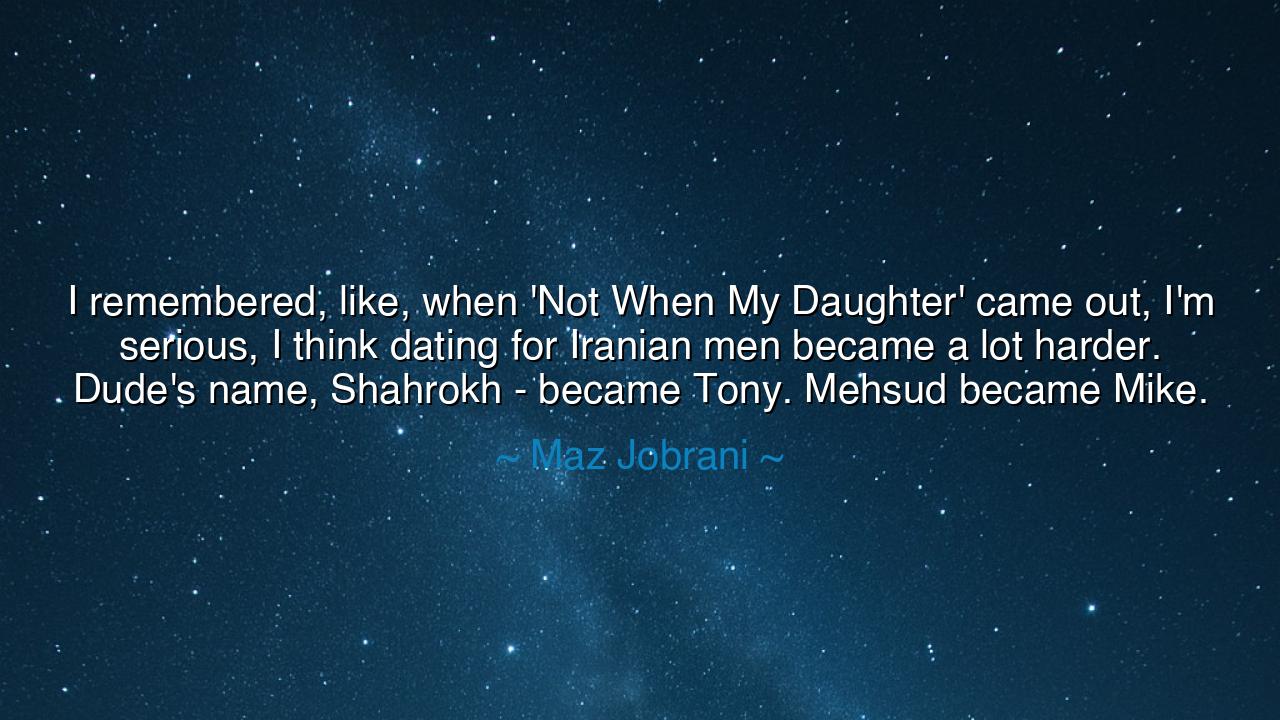
I remembered, like, when 'Not When My Daughter' came out, I'm
I remembered, like, when 'Not When My Daughter' came out, I'm serious, I think dating for Iranian men became a lot harder. Dude's name, Shahrokh - became Tony. Mehsud became Mike.






When Maz Jobrani said, “I remembered, like, when ‘Not Without My Daughter’ came out, I’m serious, I think dating for Iranian men became a lot harder. Dude’s name, Shahrokh – became Tony. Mehsud became Mike,” he spoke with humor, but beneath that laughter flowed a river of truth — the pain of misrepresentation, the longing for identity, and the power of the name. His words, though light on the surface, carry the deep wisdom of those who have lived between two worlds: the homeland that shapes them and the foreign land that misunderstands them. In his voice is the echo of every immigrant who has ever been forced to hide a piece of themselves to be accepted.
The origin of his reflection lies in a cultural moment from the early 1990s, when the film Not Without My Daughter cast a shadow upon the image of Iranian men in the Western imagination. The story — though rooted in one individual’s experience — became, in the eyes of many, a portrait of an entire people. From then on, names that once carried pride and lineage became burdens. Shahrokh and Mehsud, names woven with history, poetry, and meaning, were replaced with Tony and Mike — chosen not for identity, but for survival. What Jobrani captures with wit is, in truth, a tragedy of erasure — the silent pressure to abandon one’s origin to fit the mold of another’s comfort.
To the ancients, a name was never a mere label. It was the soul’s first garment, the sound by which the gods and the world would recognize a person. In the epic of Gilgamesh, names were spoken to grant immortality; in the Bible, to name was to give life. Thus, when a man is compelled to change his name, he is asked to shed part of his being. He becomes a wanderer in spirit, searching for the home that once existed in his own voice. Jobrani, through his comedy, exposes this wound with laughter — for laughter, as the wise once said, is the way truth travels safely through pain.
History, too, offers many mirrors to this transformation. Consider the waves of immigrants who arrived on the shores of America at the turn of the 20th century — the Italians, the Jews, the Greeks, who shortened or changed their names to blend into a world that mistrusted the foreign. The family name Goldstein became Gold, Giovanni became John, Papadopoulos became Peters. Each change carried both a promise and a loss — the promise of belonging and the loss of roots. Jobrani’s tale of Shahrokh becoming Tony is but the modern echo of this ancient migration of names, this eternal negotiation between identity and acceptance.
In his words, we also hear the ancient struggle of the outsider — the one who must prove that his humanity is the same as all others’, even when the world insists it is not. Jobrani’s humor becomes his armor, his way of turning misunderstanding into understanding. Like a wise storyteller of old, he uses jest to unmask prejudice, to show how the simplest act — a name spoken differently — can carry the weight of centuries. His joke is not cruelty; it is compassion disguised as irony, a reminder that laughter can heal what hatred divides.
Yet within this reflection lies also a call to courage. For though many may choose to adapt, there is power in those who keep their names, who wear their heritage like a banner rather than a burden. The Persian poets — Rumi, Hafez, Ferdowsi — carried their identities across empires through the power of language, through words that refused to be forgotten. The lesson of Jobrani’s quote is not merely about names, but about the soul’s refusal to vanish. To laugh at the loss is to survive it, but to reclaim it is to triumph.
The lesson, therefore, is eternal: never be ashamed of who you are, nor trade authenticity for acceptance. The world may misunderstand your name, your language, your culture — but these are not obstacles; they are treasures. To bear them with pride is to carry the fire of your ancestors through the dark corridors of time. Let others learn your name and the history it holds. Speak it clearly, with love, and let it remind you of who you are.
Thus, in Maz Jobrani’s words, hidden behind the laughter, lies a truth as old as civilization itself: that the soul’s greatest victory is to remain whole in a world that demands fragments. His humor teaches what philosophers once taught through parable — that joy and dignity can coexist, that laughter can be an act of resistance, and that to reclaim one’s name is to reclaim one’s light. And so, to all who have ever been asked to become someone else, remember this: your true name — the one spoken by your spirit — is sacred. Let no one take it from you.






AAdministratorAdministrator
Welcome, honored guests. Please leave a comment, we will respond soon